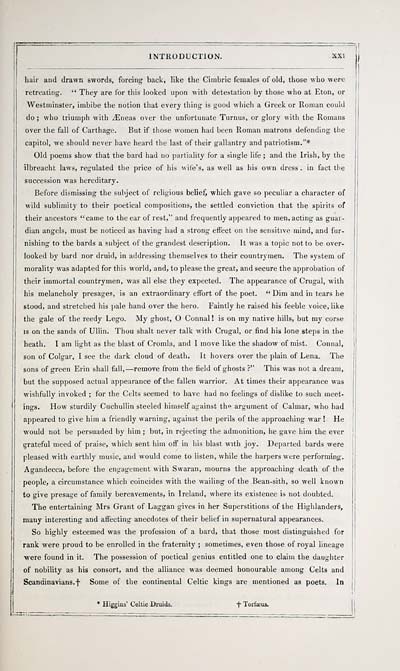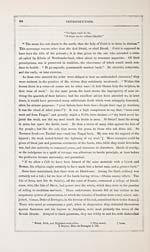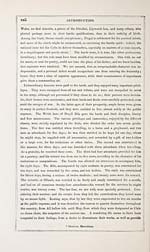Blair Collection > Sar-obair nam bard gaelach, or, The beauties of Gaelic poetry, and lives of the Highland bards
(31)
Download files
Complete book:
Individual page:
Thumbnail gallery: Grid view | List view

INTRODUCTION.
hair and drawn swords, forcing back, like the Cimbric females of old, those who were
retreating. " They are for this looked upon with detestation by those who at Eton, or
Westminster, imbibe the notion that every thing is good which a Greek or Roman could
do ; who triumph with iEneas over the unfortunate Turnus, or glory with the Romans
over the fall of Carthage. But if those women had been Roman matrons defending the
capitol, we should never have heard the last of their gallantry and patriotism."*
Old poems show that tlie bard had no partiality for a single life ; and the Irish, by the
ilbreacht laws, regulated the price of his wife's, as well as his own dress . in fact the
succession was hereditary.
Before dismissing the subject of religious belief, which gave so peculiar a character of
wild sublimity to their poetical compositions, the settled conviction that the spirits of
their ancestors "came to the ear of rest," and frequently appeared to men, acting as guar-
dian angels, must be noticed as having had a strong effect on the sensitive mind, and fur-
nishing to the bards a subject of the grandest description. It was a topic not to be over-
looked by bard nor druid, in addressing themselves to their countrymen. The system of
morality was adapted for this world, and, to please the great, and secure the approbation of
their immortal countrymen, was all else they expected. The appearance of Crugal, with
his melancholy presages, is an extraordinary effort of the poet. " Dim and in tears he
stood, and stretched his pale hand over the hero. Faintly he raised his feeble voice, like
the gale of the reedy Lego. My ghost, O Connal ! is on my native hills, but my corse
IS on the sands of Ulhn. Thou shall never talk with Crugal, or find his lone steps in the
heath. I am light as the blast of Cromla, and I move like the shadow of mist. Connal,
son of Colgar, I see the dark cloud of death. It hovers over the plain of Lena. The
sons of green Erin shall fall, — remove from the field of ghosts ?" This was not a dream,
but the supposed actual appearance of the fallen warrior. At times their appearance was
wishfully invoked ; for the Celts seemed to have had no feelings of dislik-e to such meet-
ings. How sturdily Cuchullin steeled himself against th<> argument of Calmar, who had
appeared to give him a friendly warning, against the perils of the approaching war ! He
would not be persuaded by him ; but, in rejecting the admonition, he gave him the ever
grateful meed of praise, which sent him off in his blast with joy. Departed bards were
pleased with earthly music, and would come to listen, while the harpers were performing.
Agandecca, before the engagement with Swaran, mourns the approaching death of the
people, a circumstance which coincides with the wailing of the Bean-sith, so well known
to give presage of family bereavements, in Ireland, where its existence is not doubted.
The entertaining Mrs Grant of Laggan gives in her Superstitions of the Highlanders,
many interesting and affecting anecdotes of their belief in supernatural appearances.
So highly esteemed was the profession of a bard, that those most distinguished for
rank were proud to be enrolled in the fraternity ; sometimes, even those of royal lineage
were found in it. The possession of poetical genius entitled one to claim the daughter
of nobiUty as his consort, and the alliance was deemed honourable among Celts and
Scandinavians. f Some of the continental Celtic kings are mentioned as poets. In
* Higgius Celtic Druids. •\' Torfsua.
hair and drawn swords, forcing back, like the Cimbric females of old, those who were
retreating. " They are for this looked upon with detestation by those who at Eton, or
Westminster, imbibe the notion that every thing is good which a Greek or Roman could
do ; who triumph with iEneas over the unfortunate Turnus, or glory with the Romans
over the fall of Carthage. But if those women had been Roman matrons defending the
capitol, we should never have heard the last of their gallantry and patriotism."*
Old poems show that tlie bard had no partiality for a single life ; and the Irish, by the
ilbreacht laws, regulated the price of his wife's, as well as his own dress . in fact the
succession was hereditary.
Before dismissing the subject of religious belief, which gave so peculiar a character of
wild sublimity to their poetical compositions, the settled conviction that the spirits of
their ancestors "came to the ear of rest," and frequently appeared to men, acting as guar-
dian angels, must be noticed as having had a strong effect on the sensitive mind, and fur-
nishing to the bards a subject of the grandest description. It was a topic not to be over-
looked by bard nor druid, in addressing themselves to their countrymen. The system of
morality was adapted for this world, and, to please the great, and secure the approbation of
their immortal countrymen, was all else they expected. The appearance of Crugal, with
his melancholy presages, is an extraordinary effort of the poet. " Dim and in tears he
stood, and stretched his pale hand over the hero. Faintly he raised his feeble voice, like
the gale of the reedy Lego. My ghost, O Connal ! is on my native hills, but my corse
IS on the sands of Ulhn. Thou shall never talk with Crugal, or find his lone steps in the
heath. I am light as the blast of Cromla, and I move like the shadow of mist. Connal,
son of Colgar, I see the dark cloud of death. It hovers over the plain of Lena. The
sons of green Erin shall fall, — remove from the field of ghosts ?" This was not a dream,
but the supposed actual appearance of the fallen warrior. At times their appearance was
wishfully invoked ; for the Celts seemed to have had no feelings of dislik-e to such meet-
ings. How sturdily Cuchullin steeled himself against th<> argument of Calmar, who had
appeared to give him a friendly warning, against the perils of the approaching war ! He
would not be persuaded by him ; but, in rejecting the admonition, he gave him the ever
grateful meed of praise, which sent him off in his blast with joy. Departed bards were
pleased with earthly music, and would come to listen, while the harpers were performing.
Agandecca, before the engagement with Swaran, mourns the approaching death of the
people, a circumstance which coincides with the wailing of the Bean-sith, so well known
to give presage of family bereavements, in Ireland, where its existence is not doubted.
The entertaining Mrs Grant of Laggan gives in her Superstitions of the Highlanders,
many interesting and affecting anecdotes of their belief in supernatural appearances.
So highly esteemed was the profession of a bard, that those most distinguished for
rank were proud to be enrolled in the fraternity ; sometimes, even those of royal lineage
were found in it. The possession of poetical genius entitled one to claim the daughter
of nobiUty as his consort, and the alliance was deemed honourable among Celts and
Scandinavians. f Some of the continental Celtic kings are mentioned as poets. In
* Higgius Celtic Druids. •\' Torfsua.
Set display mode to: Large image | Transcription
Images and transcriptions on this page, including medium image downloads, may be used under the Creative Commons Attribution 4.0 International Licence unless otherwise stated. ![]()
| Early Gaelic Book Collections > Blair Collection > Sar-obair nam bard gaelach, or, The beauties of Gaelic poetry, and lives of the Highland bards > (31) |
|---|
| Permanent URL | https://digital.nls.uk/81868240 |
|---|
| Description | A selection of books from a collection of more than 500 titles, mostly on religious and literary topics. Also includes some material dealing with other Celtic languages and societies. Collection created towards the end of the 19th century by Lady Evelyn Stewart Murray. |
|---|
| Description | Selected items from five 'Special and Named Printed Collections'. Includes books in Gaelic and other Celtic languages, works about the Gaels, their languages, literature, culture and history. |
|---|

